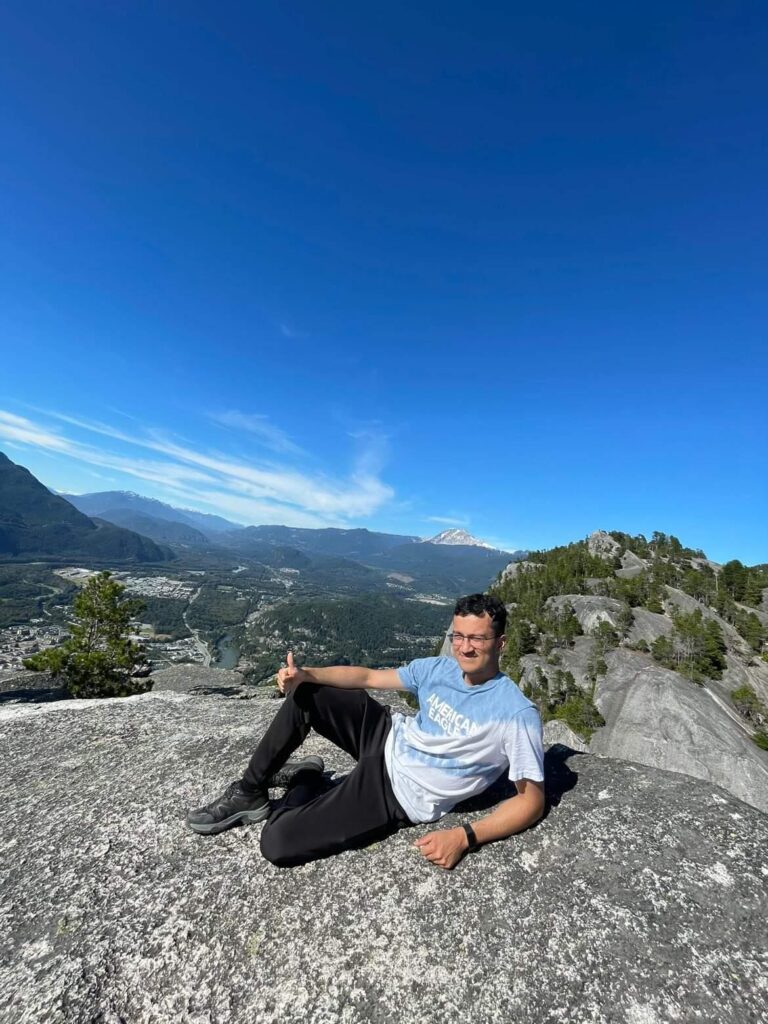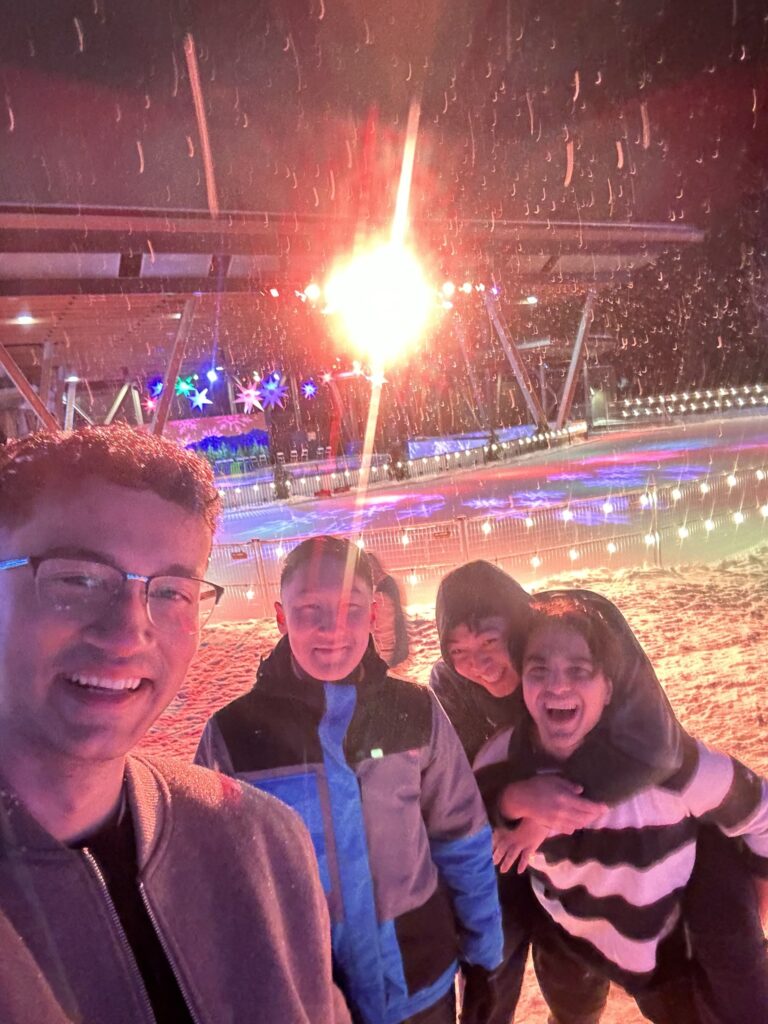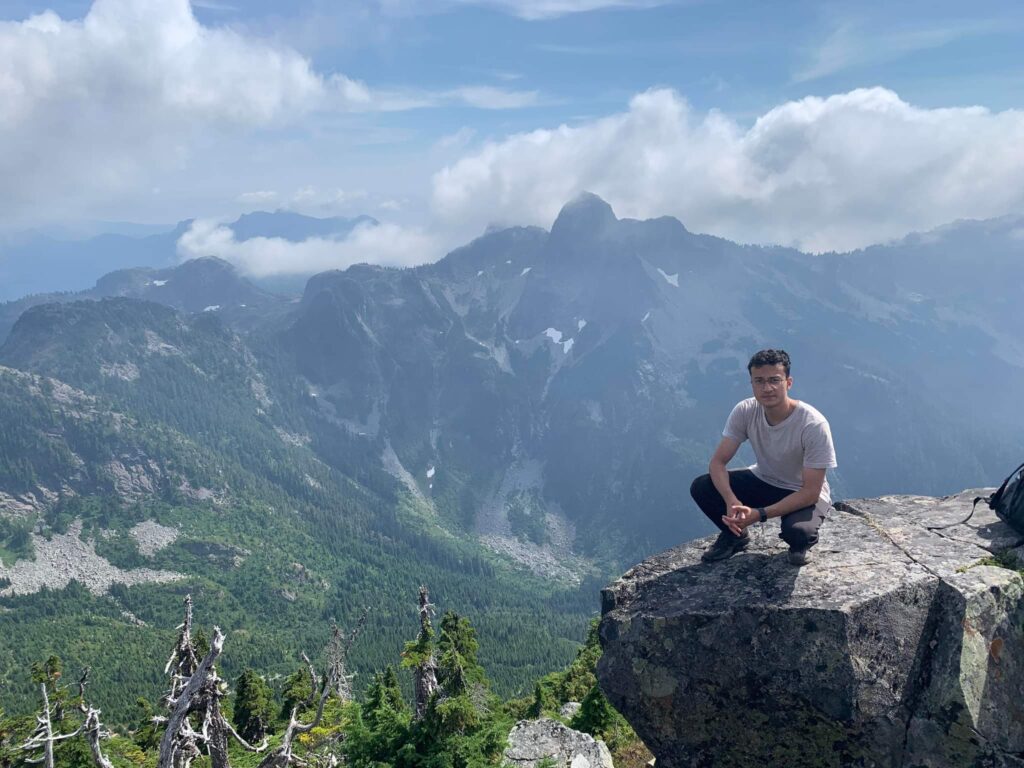Trusting the Process and Getting Obsessed with Hard Work: Sina Allen chats Internships, Tesla Inc., and the Future
When Sina Allen entered the Beedie Luminaries Scholarship Program in 2020, his main concern was getting his feet on the ground for his first year of studies at the University of British Columbia (UBC). What Sina didn’t know is that in just three years time, his life would be on very much the right path and that he would have achieved things that first-year him didn’t even know existed.
Now, as a third year Mechantronics Engineering major at UBC, Sina will be headed to Palo Alto, California this summer to work as an Engineering Intern at Tesla, Inc.. While we wait patiently to hear about how the summer goes, Sina is here now to tell us about getting obsessed with hard work, trusting the process, and making dreams come true. Read more about Sina below.
Hey Sina, you must be super busy these days. Thanks for taking the time to chat and tell us about you. By the way, congratulations!
Let’s talk about first and second year you. What did you think about U.S. internships? Did you consider it a far-fetched dream? Did you always know you’d get there?
SINA ALLEN — Working in the United States as an engineer was not always a crystal clear goal until recently, having gone through two Canadian internship experiences. The motivations for working in states shifted from the desire to work at a select cool and attractive companies, such as Tesla, to the desire to not be left stuck in Canada’s limited and small sized industry.
The journey began in the second half of my first year as I started obsessing over learning about internships and the job search process. Embarking on developing my career search skills so early on was no coincidence and it’s not something that came to me naturally. It was the result of talking to many upper year and recent graduate engineering students whom I reached out through LinkedIn, networking events and my design team. Starting early on my career development was perhaps the best decision I made by far in university and I wouldn’t have realised it without seeking peer advice from senior students. The idea that I won’t be hirable unless I have practical experience was frightening and it motivated me to really plan out my time in undergrad and set the right goals to eventually secure myself a full time position after grad in whichever company I aspire to work for.
During the same time in first year, Tesla really caught my attention as a company as it did to many other engineering students. Toward the end of my second year, I made securing an internship at Tesla a top goal for my undergrad as their hardcore engineering culture and focus on innovation and mission aligned spot on with my interests and attitude towards engineering. Simply put, I found myself spending hours and hours researching the company’s workflows, news and products…I was obsessed. Given their extremely selective hiring process, it was more of a goal floating in my subconscious and funny enough I was too afraid to even admit to myself that I’d want to intern there some day.
My motivation to work in the U.S really began to take shape after completing two engineering internships in BC during which I learned how relatively small and limited the opportunities are for mechanical engineering graduates in Canada compared to the U.S. The resources, compensation, benefits, innovation culture, human resources, projects…the list goes on, are far more abundant in the states than in Canada. The ceiling to grow is significantly higher in the States than in Canada. As much as I love living in Vancouver, this rather uneasy realisation had me seriously thinking about not only internships in the U.S, but also eventually full time positions. It was then that I made securing an internship in the U.S. a priority. With Tesla being my number one company.



Any interview highs and lows? What’s a mistake you made that you’d never want to make again, and how can you be sure to stand out to a recruiter?
My first interview offer came about 2 weeks after being referred to recruitment by a colleague of mine at UBC Solar (shout out to Andrew) who was an intern at Tesla at the time. To my surprise, he Slacked me one day and asked if I’m interested. I sent in my resume, and the rest is history.
Tesla is well known for their rigorous and highly technical interview processes and mine was no exception. I did a total of three rounds of interviews. All three were technical, with zero behavioural questions.
During the first round, which I had a day to prepare for, I was interviewed by a Mechanical Design Engineer from the team. I was asked about my projects from my design team (UBC Solar) and my most recent internship at the time. Theoretical questions that tested my knowledge on physics, manufacturing and first principles thinking were also discussed. Second round was with a staff engineer, however this time the interview was very open ended in that I could choose a project to present that I am most proud of and my interviewer asked follow up questions on it. Again, I had about a day or two to prepare; however, from my first interview I really narrowed down the topics and that bought me time to prepare more. I wasn’t expecting the unstructured style of the interview and so this time it definitely didn’t go as smoothly. With that being said, I still could see the possibility of progressing further in the recruitment process.
Fortunately, a third round interview invitation pulled through, this time with a senior manager. This round was unforgettable in that the nerves really got to me and I was given a week to prepare. As I did with my previous round, I focused my time on engineering and physics topics I was previously inquired on. I mean what are the chances they’ll question me on something different? The interview started with us discussing the Challenger space shuttle o-ring seal failure…then we discussed fluid dynamics…none of the topics I was inquired about in the previous rounds were covered. Despite being nervous, I managed to scrape together sensible answers based on what I knew from my second year courses and internship experiences, while keeping a thoughtful discussion going.
Post third round I did not feel confident as there were many moments where I felt my back against the wall, unable to answer logically and so anxious where I forgot about concepts as basic as the Bernoulli’s equation.
However as we know, I was able to receive an offer and here are some things that I think I did well or wish I did better that led to my success:
- Keep it a conversation. Remember that how you carry yourself out, your attitude and the vibes you bring to the interview is all going to affect your assessment. I often like to think of these technical interviews as a chance to discuss “intellectually pleasing topics” with highly intelligent people. With this mindset, I am able to ease my stress and convey genuine curiosity, something that any technical recruiter can appreciate.
- Follow up on point number 1, never say “I don’t know” and just end your response with that. In these technical style interviews, interviewers love to just keep asking follow up questions and dig further into fundamental concepts until you are outside of your knowledge circle. This is their favourite spot, because it is here where your thought process can shine through and that’s mostly what they care about. If you can’t provide a straight up response, THAT’S TOTALLY FINE. It’s now important to walk your interviewer through how you might reason through certain possible answers in a conversational manner! Let them know your assumptions, ask them for clarification and to help you guide to a sensible solution/answer.
- Don’t forget about the professional details. Be 2-3 minutes early for scheduled meetings. Be punctual with your email responses. Send follow up thank you emails to your recruiter and interviewers. Whether you succeeded or not, connect with your recruiter and interviewer on LinkedIn after the recruitment process has been completed. You want to keep these connections for future applications.
- Ask for help and advice and leverage your existing connections. Before my first interview, I got on a call with a current full-time engineer whom I knew from my design team. Not only were we able to do a mock interview, he also informed me of the technical values that are important to the specific team I was applying to. Know someone, who has interned or worked or is currently working at the company? Reach out!
- Know the skills/projects you want to highlight in the allotted time. Here I am specifically referring to my second round where the interview was left open-ended for me to discuss whatever project I deemed worthy. It’s crucial to know which skills and projects to highlight during an interview. If you have an open-ended question, prioritise the projects that best showcase your technical expertise and align with the team’s values.

Wow, thank you for all of this insight. Okay, so let’s fast forward: tell us about receiving your acceptance to intern at Tesla.
The days leading up to receiving the offer were the worst. Every day that passed I was getting more and more convinced that I did not make the cut. My mindspace filled with the classic, post interview self doubt thoughts: “oh I wish I said this”, “said that”, “asked for clarification here”, “highlighted this project instead”, etc.
I was at work, about to drive to a contractor when I saw an email notification pop up from my recruiter. And there it was my unofficial offer. After two years of constant daydreaming, planning out projects and initiatives, growing my technical skill set through my design team and personal projects, growing my network and hours and hours of research into Tesla, learning about the ins/outs of the products, the leadership team and the culture before I even began interviewing with them, it finally all paid off. Wow I made it! And I made it one year sooner than my initial goal (in my head I had planned to apply for 2024 internships as I thought I wasn’t good enough just yet). I am going to be an engineering intern at Tesla! I was also immediately celebrated at work by my colleagues who were aware I was going through the recruitment process.
Soon after, I was hit by the imminent waves of feelings of imposter syndrome …“oh, it could have been a fluke”…“I just got lucky” and the worst of all, that indescribable feeling of emptiness you get after achieving something you have had your eyes on for so long that sends you down an existential spiral…yes those came with my acceptance too.
But we made it through that so don’t worry. 😊
Where do you hope to go now? What are you most excited to learn/gain this summer?
One of my favourite perspectives of an internship is to treat it as the real interview (shoutout to my Beedie Luminary mentor, Paulo for sharing this advice with me early on). With that mindset, I see this internship as an opportunity to do my best work, knowing well that whatever I put in, is what I’ll gain from this experience.
On top of growing my technical skill sets, I hope to also grow my professional network. Being in the Bay Area, I am surrounded by some of the brightest minds from all over the world and I recognize that the connections that I make during my time will be the most valuable asset that I’ll carry with myself, once my term is over. And hey, if I enjoy the work that I do and the people I work with, why not try for a return offer 😝
Alright. Last one. What are some things you believe contributed to your success?
Looking back at my journey over the past two years, I firmly believe I am here because of the constant effort I placed on growing my network and deepening my existing connections. Your network is your net worth! As you know from question 2, I was able to get my first interview because I was referred by the former electrical lead (Andrew) from UBC Solar, while he was completing his internship. To prove a point, I never directly worked with Andrew as I am on the mechanical side of things. Nor did I directly ask him for a referral. He reached out to me because he must have noticed the interactions that I did have with the team and the mini conversations that I had with him outside of my design team and saw a fit!
Lesson here is you’ll truly never know what each connection you have could do to change or expedite the trajectory of your life. So it’s best advisable to take a leap of faith with every person you interact with, do your best work, treat them with respect and don’t be afraid to build a personal bond. Whether they are classmates, design team members, professors, colleagues, roommates and fellow Luminaries, put your best foot forward, get yourself with all your passions out there and build your connections!
Here are some other words of wisdom that I wish someone instilled in me while I was desperately doubting myself on whether I’d be able to secure an internship at Tesla and other similarly competitive companies:
- You are truly capped by yourself and the limits of what you think you are capable of. Everyone has insecurities. The top engineers working at these companies have no biophysical differences than you. Passion combined with discipline is 🔑
- If you are in engineering or any other technical field and have ambitions to work in industry… don’t think it’s the end of the world if your grades suffer. Whether it’s for design team commitments, a technical personal project, job search, networking etc. your return of investment on these tasks are far more valuable to your career success than a letter grade difference on your transcript. Remember that grades don’t define you and the quality of work you are able to produce. Any employer who has experience hiring talented individuals is aware of this fact.
THANKS, SINA! TESLA IS LUCKY TO HAVE YOU!
Read more about Beedie Luminaries like Sina here. #BeedieBright!
